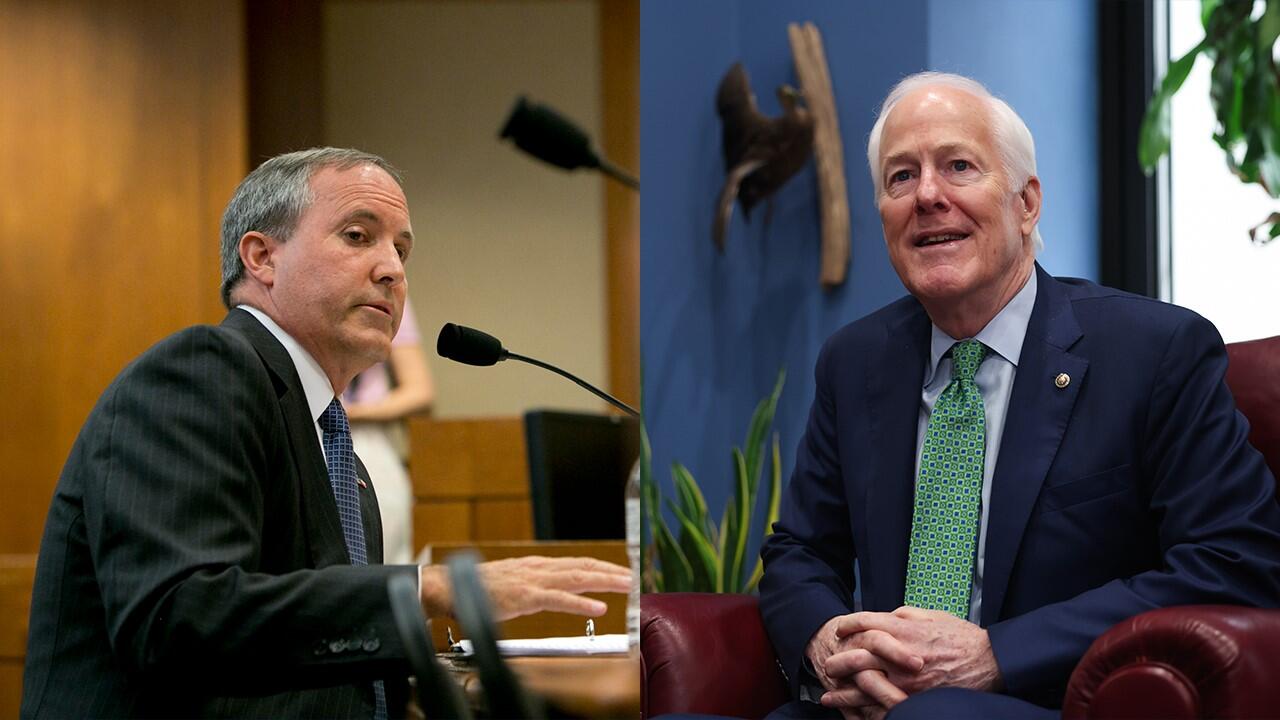
The race for the U.S. Senate seat held by John Cornyn is heating up, with Ken Paxton, Texas' attorney general, emerging as a formidable challenger.
What was initially shaping up to be a relatively quiet primary battle has suddenly become a political spectacle, with a personal scandal now shaking the foundations of Paxton’s campaign.
Paxton’s wife, Angela Paxton, made headlines when she announced her decision to file for divorce after 38 years of marriage, citing "biblical grounds." This revelation has sparked intense political and public scrutiny, shifting the dynamics of what was once a comfortable lead for Paxton.
For much of the year, Paxton was seen as the frontrunner in the Texas Senate race. In April, when he announced his bid to challenge Cornyn in the 2026 Republican primary, many political observers believed that Paxton, a staunch ally of President Donald Trump, would easily ride the wave of conservative support to victory.
Early polling showed Paxton enjoying strong support among Texas Republicans, many of whom viewed him as a champion of the party’s most ardent conservative values.
Paxton’s rise had been fueled by a series of political victories, including his acquittal in a highly publicized impeachment trial in 2023.
Later, he settled a long-standing securities fraud case, avoiding jail time but paying $300,000 in restitution. These developments, along with his role in securing key judicial appointments in Texas, bolstered his reputation among his base, making him a powerful force within the Republican Party.

On the other hand, Cornyn, the senior U.S. senator from Texas, had been struggling to maintain his hold on the GOP base.
Despite his long tenure in the Senate and his significant influence within the party, Cornyn was frequently branded a "RINO" (Republican in Name Only) by certain factions of the party.
His perceived lack of loyalty to Trump and his moderate stance on some issues made him a target for more conservative elements within the GOP, including Paxton and his supporters.
Polling conducted in May and June showed Paxton leading Cornyn by significant margins, with some surveys indicating a double-digit advantage.
The race was shaping up to be a classic contest between the establishment Republican (Cornyn) and the upstart challenger (Paxton), with the GOP base firmly behind Paxton’s campaign.
However, the narrative of the Paxton-Cornyn race began to shift dramatically in July when Angela Paxton posted a message on Facebook that rocked the political world.
In a heartfelt statement, she revealed that after 38 years of marriage, she had filed for divorce from Ken Paxton on “biblical grounds.” The announcement shocked many in Texas and beyond, as the Paxtons had long been seen as a power couple in conservative circles.
Angela Paxton’s post did not provide specifics about the reasons behind the divorce, but she alluded to “recent discoveries” that had led her to make the difficult decision.

While she did not directly reference Paxton’s alleged extramarital affair, which had been a topic of discussion during his impeachment proceedings, the implications were clear. The “biblical grounds” for divorce seemed to hint at Paxton’s personal failings, further tarnishing his image.
The timing of the divorce announcement could not have been more significant. Just as the primary race was gaining momentum, this personal scandal cast a shadow over Paxton’s campaign.
For many conservative voters in Texas, family values and personal integrity are paramount, and the revelation of Paxton’s troubled marriage raised questions about his character. The scandal created a political firestorm, and Paxton’s once-stable lead in the polls began to erode.
The impact of the divorce announcement on Paxton’s campaign was immediate. Texas Values, a prominent socially conservative organization, quickly withdrew its endorsement of Paxton, signaling the potential fallout among conservative groups.
Paxton’s rivals, including Cornyn, wasted no time in amplifying the story, with Cornyn’s campaign using the marital discord as a political weapon to undermine Paxton’s candidacy.
In the world of Texas politics, where personal integrity is often a key factor in voter decisions, the Paxton divorce became a focal point in the race.
The scandal overshadowed Paxton’s political achievements, including his role in securing judicial appointments and his victory in the impeachment trial.

Instead, voters began to focus on the personal aspects of Paxton’s life, questioning whether his personal failings would undermine his ability to serve in the U.S. Senate.
By August, polling had begun to reflect the shift in the race. A poll from Emerson College showed that Paxton’s once-commanding lead had evaporated, with Cornyn now holding a narrow 1-point advantage.
While the poll did not explicitly cite the divorce as the reason for the shift, the timing suggested that it was a major factor.
In the absence of any major policy debates or issue-driven news, the personal drama surrounding Paxton dominated the political discourse, changing the dynamics of the race.
The Paxton divorce scandal has had far-reaching implications, not just for the race itself but for the Republican Party as a whole.
The controversy has highlighted the deep divisions within the GOP, with some members rallying behind Paxton while others, particularly those in the more establishment wing, are questioning his ability to represent the party.
The scandal has also opened the door for Democrats, who see an opportunity to capitalize on Paxton’s vulnerabilities in the general election.
Democrats have long viewed Paxton as a controversial figure, given his legal troubles and his role in efforts to overturn the results of the 2020 presidential election.

Now, with his personal life under scrutiny, they see a chance to exploit his weaknesses and make inroads in Texas, a state that has long been a Republican stronghold.
The possibility of Paxton’s personal issues becoming a major talking point in the general election has raised concerns among some Republicans that he could be a liability in November 2026.
For Cornyn, the shift in the race has provided an unexpected opportunity. While he remains a divisive figure among some Republicans, the divorce scandal has allowed him to reposition himself as the more stable and reliable choice for Senate.
The polls indicating a narrow lead for Cornyn suggest that he has successfully capitalized on Paxton’s personal turmoil, at least in the short term.
As the race continues to unfold, both Paxton and Cornyn face significant challenges.
For Paxton, the next few months will be critical in determining whether he can recover from the fallout of his divorce and regain the momentum he once enjoyed.
He will need to rebuild trust among conservative voters, particularly those who were swayed by the personal drama surrounding his marriage.

Whether Paxton can weather this scandal and refocus the campaign on policy issues remains to be seen.
For Cornyn, the race is far from over. While the divorce has given him a temporary advantage, he must continue to rally support from conservative voters who have long been skeptical of him.
Cornyn’s challenge will be to maintain his lead while navigating the complexities of the GOP base. The presence of Paxton, a staunch Trump ally, in the race means that Cornyn will have to contend with a faction of the party that is firmly aligned with Trump’s brand of politics.
In the end, the outcome of the Paxton-Cornyn race will likely depend on how voters respond to the personal and political dynamics at play.
Paxton’s ability to overcome the scandal surrounding his marriage, along with his controversial legal history, will be key to his success.
For Cornyn, the challenge will be to unite the GOP behind his candidacy and secure the support of conservative voters who may have previously been wary of him.



